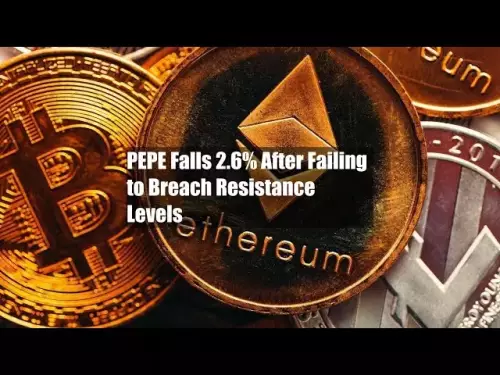-
 bitcoin
bitcoin $123963.239194 USD
1.37% -
 ethereum
ethereum $4529.082464 USD
1.07% -
 xrp
xrp $2.983640 USD
0.71% -
 tether
tether $1.000287 USD
0.02% -
 bnb
bnb $1179.874393 USD
2.99% -
 solana
solana $230.633678 USD
1.55% -
 usd-coin
usd-coin $0.999835 USD
0.03% -
 dogecoin
dogecoin $0.254240 USD
1.34% -
 tron
tron $0.341176 USD
0.15% -
 cardano
cardano $0.842285 USD
0.52% -
 hyperliquid
hyperliquid $48.537896 USD
-0.86% -
 chainlink
chainlink $21.863092 USD
-0.84% -
 ethena-usde
ethena-usde $0.999743 USD
-0.07% -
 sui
sui $3.579561 USD
-0.18% -
 stellar
stellar $0.403418 USD
2.67%
What is a suitable leverage multiplier for perpetual contract trading?
One critical factor in perpetual contract trading is choosing a suitable leverage multiplier, which magnifies both potential profits and losses and should align with your risk tolerance, trading experience, and the volatility of the underlying asset.
Dec 13, 2024 at 10:31 am
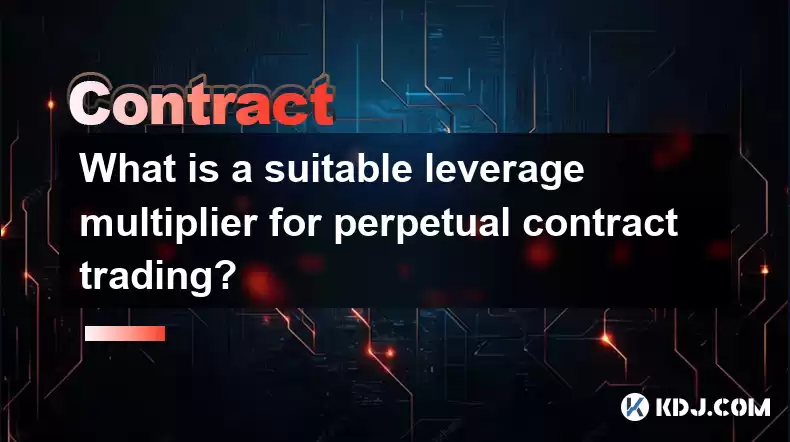
What is a Suitable Leverage Multiplier for Perpetual Contract Trading?
Perpetual contracts, also known as inverse futures, are a type of derivative instrument that allows traders to gain exposure to the price of an underlying asset without having to own it outright. Perpetual contracts are traded on exchanges like Binance, Huobi, and OKEx, and they offer a variety of advantages, including:
- Higher leverage: Perpetual contracts offer higher leverage than traditional futures contracts, which allows traders to amplify their profits (and losses).
- No expiration date: Perpetual contracts do not have an expiration date, so traders can hold them indefinitely.
- 24/7 trading: Perpetual contracts are traded 24 hours a day, 7 days a week, which provides traders with greater flexibility.
While perpetual contracts offer a number of advantages, they also come with some risks. One of the biggest risks is the potential for liquidation. Liquidation occurs when a trader's losses exceed their available margin. If this happens, the trader will be forced to sell their position at a loss.
To avoid liquidation, it is important to choose a suitable leverage multiplier for your perpetual contract trades. The leverage multiplier is the ratio of your position size to your margin. For example, a leverage multiplier of 10 means that you are trading with 10 times the amount of capital that you have in your margin account.
The higher the leverage multiplier, the greater the potential for both profit and loss. However, it is important to remember that the higher the leverage, the greater the risk of liquidation.
So, what is a suitable leverage multiplier for perpetual contract trading? The answer to this question depends on a number of factors, including:
- Your risk tolerance: The higher your risk tolerance, the higher the leverage multiplier you can use.
- Your trading experience: If you are a new trader, it is best to start with a lower leverage multiplier.
- The volatility of the underlying asset: The more volatile the underlying asset, the lower the leverage multiplier you should use.
As a general rule of thumb, it is best to start with a leverage multiplier of 5 or 10. Once you have gained some experience, you can gradually increase the leverage multiplier as your risk tolerance and trading skills improve.
Here are some tips for choosing a suitable leverage multiplier for perpetual contract trading:
- Start with a low leverage multiplier: It is always better to start with a low leverage multiplier and gradually increase it as you gain experience.
- Consider your risk tolerance: The higher your risk tolerance, the higher the leverage multiplier you can use.
- Consider the volatility of the underlying asset: The more volatile the underlying asset, the lower the leverage multiplier you should use.
- Monitor your trades closely: It is important to monitor your trades closely, especially when using high leverage.
- Be prepared to adjust your leverage multiplier: As the market conditions change, you may need to adjust your leverage multiplier.
By following these tips, you can choose a suitable leverage multiplier for your perpetual contract trades and reduce the risk of liquidation.
Other Factors to Consider When Choosing a Leverage Multiplier
In addition to the factors discussed above, there are a number of other factors that you should consider when choosing a leverage multiplier for perpetual contract trading. These factors include:
- Your trading strategy: The type of trading strategy you are using will impact the leverage multiplier you should use. For example, if you are using a scalping strategy, you will need to use a lower leverage multiplier than if you are using a swing trading strategy.
- The market conditions: The market conditions will also impact the leverage multiplier you should use. For example, if the market is volatile, you will need to use a lower leverage multiplier than if the market is range-bound.
- Your account size: The size of your trading account will also impact the leverage multiplier you should use. If you have a small account, you will need to use a lower leverage multiplier than if you have a large account.
By considering all of these factors, you can choose a suitable leverage multiplier for your perpetual contract trades and reduce the risk of liquidation.
Disclaimer:info@kdj.com
The information provided is not trading advice. kdj.com does not assume any responsibility for any investments made based on the information provided in this article. Cryptocurrencies are highly volatile and it is highly recommended that you invest with caution after thorough research!
If you believe that the content used on this website infringes your copyright, please contact us immediately (info@kdj.com) and we will delete it promptly.
- BlockDAG, DOGE, HYPE Sponsorship: Crypto Trends Shaping 2025
- 2025-10-01 00:25:13
- Deutsche Börse and Circle: A StableCoin Adoption Powerhouse in Europe
- 2025-10-01 00:25:13
- BlockDAG's Presale Buzz: Is It the Crypto to Watch in October 2025?
- 2025-10-01 00:30:13
- Bitcoin, Crypto, and IQ: When Genius Meets Digital Gold?
- 2025-10-01 00:30:13
- Stablecoins, American Innovation, and Wallet Tokens: The Next Frontier
- 2025-10-01 00:35:12
- NBU, Coins, and Crypto in Ukraine: A New Yorker's Take
- 2025-10-01 00:45:14
Related knowledge
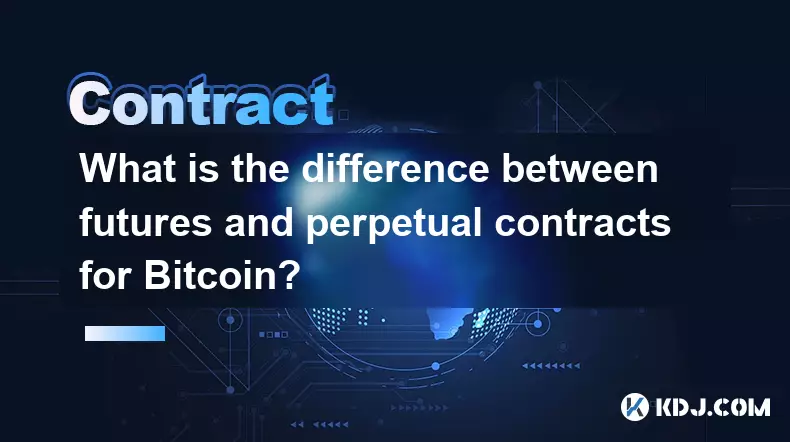
What is the difference between futures and perpetual contracts for Bitcoin?
Oct 02,2025 at 11:54pm
Understanding Bitcoin Futures Contracts1. Bitcoin futures are derivative instruments that allow traders to speculate on the future price of Bitcoin at...
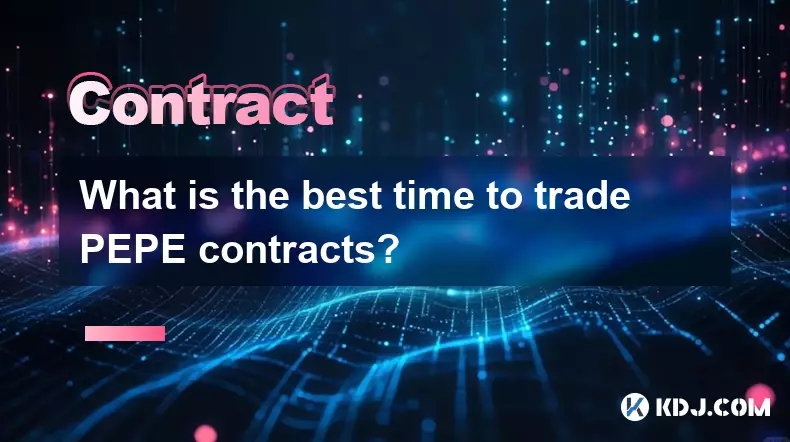
What is the best time to trade PEPE contracts?
Oct 03,2025 at 11:54am
Understanding PEPE Contract Volatility1. PEPE contracts exhibit extreme price fluctuations due to their meme-based nature and low market cap. Trading ...
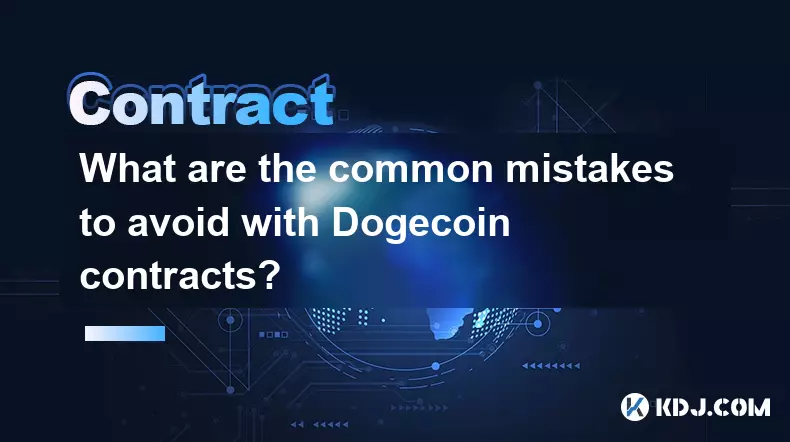
What are the common mistakes to avoid with Bitcoincoin contracts?
Oct 03,2025 at 08:54am
Emerging Trends in the Cryptocurrency Market1. Decentralized finance (DeFi) platforms continue to expand their influence across the blockchain ecosyst...

What is the maintenance margin for Bitcoin contracts?
Oct 02,2025 at 01:36am
Decentralized Exchanges Gain Momentum in 20241. Decentralized exchanges (DEXs) have seen a significant rise in trading volume, surpassing centralized ...
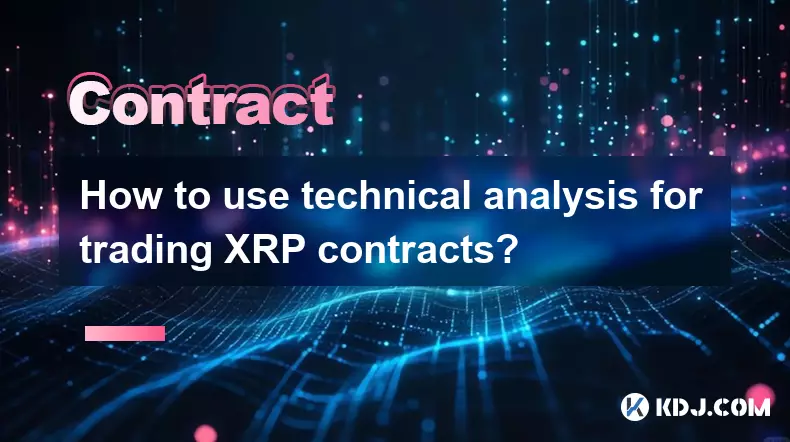
How to use technical analysis for trading XRP contracts?
Oct 03,2025 at 01:18pm
Understanding Price Patterns in XRP Futures1. Identifying chart patterns such as triangles, head and shoulders, and double tops or bottoms can provide...

What does "longing" PEPE contracts mean?
Oct 03,2025 at 11:54pm
Understanding Decentralized Exchanges in the Crypto Ecosystem1. Decentralized exchanges (DEXs) operate without a central authority, allowing users to ...

What is the difference between futures and perpetual contracts for Bitcoin?
Oct 02,2025 at 11:54pm
Understanding Bitcoin Futures Contracts1. Bitcoin futures are derivative instruments that allow traders to speculate on the future price of Bitcoin at...

What is the best time to trade PEPE contracts?
Oct 03,2025 at 11:54am
Understanding PEPE Contract Volatility1. PEPE contracts exhibit extreme price fluctuations due to their meme-based nature and low market cap. Trading ...

What are the common mistakes to avoid with Bitcoincoin contracts?
Oct 03,2025 at 08:54am
Emerging Trends in the Cryptocurrency Market1. Decentralized finance (DeFi) platforms continue to expand their influence across the blockchain ecosyst...

What is the maintenance margin for Bitcoin contracts?
Oct 02,2025 at 01:36am
Decentralized Exchanges Gain Momentum in 20241. Decentralized exchanges (DEXs) have seen a significant rise in trading volume, surpassing centralized ...

How to use technical analysis for trading XRP contracts?
Oct 03,2025 at 01:18pm
Understanding Price Patterns in XRP Futures1. Identifying chart patterns such as triangles, head and shoulders, and double tops or bottoms can provide...

What does "longing" PEPE contracts mean?
Oct 03,2025 at 11:54pm
Understanding Decentralized Exchanges in the Crypto Ecosystem1. Decentralized exchanges (DEXs) operate without a central authority, allowing users to ...
See all articles

























